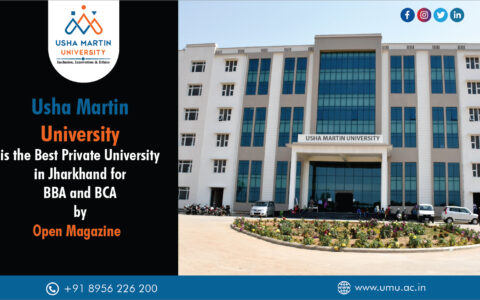
“QS I.GAUGE E-LEAD” Certificate
June 16, 2020
Building faculty Capacity in the Region
June 18, 2020In keeping with its avowed values of learner commitment and quality teaching- learning practices, the Usha Martin University, gave a firm commitment to its entire learner body that notwithstanding the challenges of campus closure, the University would ensure complete coverage of the pending syllabus for all classes. This was put in operation in the third week of March, even before the government directive for HEIs to adopt online practices to transact their unfinished syllabi was received.
At UMU, the key reason for this decision, besides completing the unfinished syllabi, was the commitment to keep learners engaged and involved, during the period of being completely confined at home and to ensure that their learning goes on uninturrupted.
While some faculty members had capabilities in online teaching , quite a few did not. The solution was sought in faculty training which was done using in-house faculty expertise, sharing actual sessions by those who had the expertise and this was all accomplished through online training webinars involving hand on work.
To maintain a semblance of a functional working day at campus, the learners of each class were given a time table engaging them for about four hours each day, taking care to provide some break between successive online sessions so that the digital fatigue and lack of attention does not set in. Likewise, entire faculty got involved in engaging at least two online session each day
Using largely open source or free applications, the teachers engaged classes using a variety of applications like Skype, Google Meet, JITSE, Go to Webinar and Zoom, among others. For some basic courses audio vision and audio recording applications were also used. While some interaction took place during the sessions, learner’s queries and their resolution was largely managed through WhatsApp groups for each class or Google groups. Faculty took care to maintain a response time of 48 hours as was envisaged in UMU learner support norms. Consistently following of the class schedule resulted in the courses for most classes getting completed by 15th of May. As a follow-up measure, revision classes were scheduled after giving the students enough time to go through their modules.
Using a judicious mix of assignments, projects, quizzes and case studies, the faculty carried out the continuous assessment component of the evaluation system at UMU.
Throughout this exercise of engaging and assessing learners, the University was conscious of the fact that some learners in remote areas and rural locations would not be able to take advantage of this provision on account of lack of Internet connectivity in these locations. All the sessions therefore were recorded and made accessible to those who could not attend the sessions.
Now, as they await the scheduling of the final examinations, the learners are
being supported by their respective teachers through problem solving and mentoring support using social media applications





